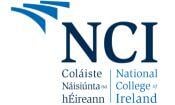
Data analysis is an area of great opportunity and there is increasing demand for people with these skills in the jobs market, both here in Ireland and internationally.
It’s no surprise that this is always a very popular course to chat about at our online open events. Attending these events gives you the opportunity to virtually meet lecturers before you apply for a course at NCI where you can ask them questions about the course. Our Admissions and Springboard+ Teams will also be available to answer any questions you have in relation to the application process.
We asked our School of Computing team to answer some frequently asked questions about studying data analytics at National College of Ireland.
Which Data Analytics course would suit my level of experience and skills: the MSc in Data Analytics, Postgraduate Diploma (PGD) or Higher Diploma (H Dip)?
Students with backgrounds in the physical sciences, business and other technically minded domains, but without extensive experience in the computer science field, should consider the H. Dip course. This course starts off without the assumption of much knowledge of data analytics techniques, and rapidly builds the user up to familiarity with the skills required of a data analyst. It is possible to complete this course and move on to the MSc or PGD registers.
Students with more advanced computing skills, who have a background in programming or who have experience in the field of data analytics would benefit from the PGD or MSc courses, as these courses are designed to build upon existing skills and knowledge and allow the learner to hone their talents to perfection.
What is the distribution of learning outcomes between the mathematical/statistical elements and the technical/programming elements?
Each of the three courses has a balanced blend of learning outcomes, including problem-solving and design, mathematical and statistical rigour and technical skills. Most modules emphasise the use of technology to solve business or other domain problems with mathematically rigorous results.
Which industries make use of data analytics?
Data Analytics is particularly prevalent in the financial services and large scale retail sectors, but it is also growing in importance to smaller-scale businesses as data availability and available processing power grow with each passing year. Analytics are also common in fields as diverse as IT Security, Defence and the Physical Sciences from Bioinformatics to Astrophysics.
How big are the class sizes?
MSc Classes are typically approximately 50-60 students. PGD classes are approximately 30-40 students. On occasion, shared modules are taken simultaneously by PGD and MSc students. H. Dip. classes are typically 50-70 students in size, and there are occasionally multiple simultaneous cohorts of students on this course. At each level, peer support has proven an invaluable resource for the students on these courses.
Do these courses require extensive programming and software experience?
The H. Dip. course does not require extensive past experience with programming or computing expertise, but this can give a student a bit of an edge. Higher Diploma courses start from the basics of programming, databases and relevant mathematical techniques for data analytics, and rapidly provide students with the knowledge they need to become an expert.
However, prior programming knowledge is require for applicants of the Postgraduate Diploma and MSc in Data Analytics courses. Take a look at the 'Entry Requirements' tab on the course pages for further information.
What are the programming tools being used on the course?
R and Python are the main programming tools. Students will also use SQL and WEKA
What is the time commitment for the course both contact hours and self-study requirements?
1 is up to 125 hours per semester per 5-credit module. It will be different for everyone. Class time are as per schedule (refer to the course pages for further information on class schedules).
Is there any other detail available beyond what’s in the prospectus?
You’ll find details on each individual module for the courses and recommended reading and websites of interest on Coursebuilder:
- Higher Diploma in Science in Data Analytics
- Postgraduate Diploma in Science in Data Analytics
- MSc in Data Analytics
What if I don’t meet the entry requirements?
The college operates a Recognition of Prior Experiential Learning (RPEL) scheme meaning applicants who do not meet the normal academic requirements may be considered based on relevant work and other experience.
What are the laptop requirements for these courses?
This programme has a BYOD (Bring Your Own Device) policy. Specifically, students are expected to successfully participate in lectures, laboratories and projects using a portable computer (laptop/notebook) with a substantial hardware configuration. The minimal suitable configuration is 8GB of RAM (16GB are recommended); a modern 64-bit x86 multi-core processor (Intel i5 or superior); 250+ GB of available space in hard disk; WiFi card; and a recent version of Ubuntu, macOS or Windows.
It is the responsibility of each student to ensure their computer is functioning correctly and that they have full administrator rights. NCI IT cannot provide support for these personal devices.
Hear from data analytics graduate Darren Malone
If you're considering changing your career and you want to hear from a data analytics graduate, watch this video to hear about Darren's experience studying data analytics at National College of Ireland.
Studying data analytics through Springboard+ at NCI
At National College of Ireland, we have the opportunity to offer a number of computing courses for free or at a reduced cost to eligible applicants under the Springboard+. These courses are free of charge for those who are unemployed and for those who are in employed, there will be a fee of 10% of the normal course fee (visit the Springboard+ website for information on the eligibility criteria).
Applications for data analytics courses starting at NCI are open, click the links below to apply on the Springboard+ website for your chosen course:
- Higher Diploma in Science in Data Analytics - 1 Year, Blended/Online
- Postgraduate Diploma in Science in Data Analytics - 1 Year, Blended/Online
Places are limited, applications will close when classes are full so we would encourage those interested to apply as soon as possible (applying is free of charge).
See what our Springboard+ graduates say about say about our courses...
Springboard+ is co-funded by the Government of Ireland and the European Union. Visit our Springboard+ page for full details of the courses currently available.











